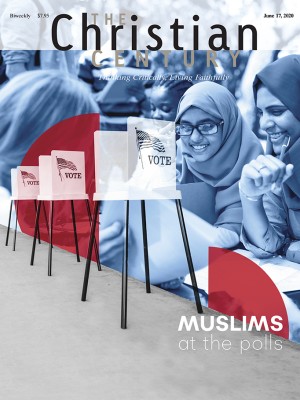June 28, Ordinary Time 13A (Matthew 10:40–42)
What happens when we are the refugees, the strangers, and the dying?
I remember the first time I preached on this short passage of scripture, out in rural South Dakota. Just three verses, and I thought I had a rousing sermon on reaching out to the little ones, giving a cup of water to those who need it, and seeing Jesus. I even told a story I gleaned from the Century, about a family who prayed “Come Lord Jesus, be our guest” at a local fast-food establishment, and how the little girl saw Jesus in the face of a homeless man who needed a hamburger.
That particular week, there was a stranger in town. He wandered around our town, sitting on people’s front porches and asking for help. We very rarely saw strangers in this tiny town. But one of my parish members said to me, in the middle of the week, “We gave him a sandwich, because of your sermon!”
Read our latest issue or browse back issues.
It was a heady moment for a young pastor. I thought, People do listen to what I am saying, at least some of the time.
So here I am, some 20-odd years later, reading these three small verses again and feeling like there is something that I skipped right over in this passage. It’s that very first phrase, “whoever welcomes you welcomes me.” This makes me uncomfortable, as I have always read this passage as an exhortation for me to see the face of Christ in other people, particularly “the little ones.” Why did I skip over that very first phrase, and what does it mean?
Jesus says these words to his disciples—his particular group of disciples in the first century and, possibly, us. I think that I blinked right over the phrase the first time because, truthfully, I don’t think of myself as being welcomed so much as being the one who welcomes. I’m the one standing in the entry to the church, after all, welcoming the visitors to worship. I’m the one in the center of things, which is the church. In my little churches in South Dakota, the church was the center of the community. In fact, the church was almost the only public institution left in the community, except for the post office.
But Jesus doesn’t imagine it this way. He doesn’t imagine that any of his disciples is in the center of society. They would not be so much extending hospitality as they would be receiving it. Jesus imagines his disciples on the edges of society, holding this great treasure, but also needing welcome: a cup of water, a square meal, a roof over their heads.
Jesus’ words make me distinctly uncomfortable. They make me realize that I have a privilege his early disciples did not have. I have power. I have the power to welcome others—or to turn my back. This is true not just in my church, but in my community and country, where we cannot decide whether we are going to receive refugees or not. I think that Jesus’ words here apply to those refugees more than they apply to me. I don’t need to be welcomed like they do.
Jesus’ words also make me uncomfortable because I realize the distance between those disciples and me. Maybe Jesus never meant us to be that powerful. Maybe he meant for us to be the refugees, the ones needing assistance. Maybe from these places we can give a more powerful witness to the power of God’s love—from the places of vulnerability.
Jesus never meant us to be powerful. Jesus never meant us to hold all of the cards—just this one card, this ace in the hole. We are to go out without weapons but with hands that heal like Jesus’ hands, with words that cut and cure like his. That’s it.
If we are not in the position of having all the goods, of being able to welcome people, who are we? If we are not in the position of power—if we are not rich and in the center, where everyone looks for meaning—who are we? The decision not to meet for Easter this year caused me a profound sense of dislocation. Who am I? If I cannot welcome the large crowds and say the words and put the bread and wine into people’s hands, who am I?
I do wonder if this sense of dislocation might be a good thing. I won’t downplay the gravity of the moment in which we find ourselves. People are dying. People are losing their jobs. But I am imagining a new reality. Even after the COVID-19 crisis, I wonder if we’ll still be asking who we are. In the new reality, we will not simply be looking at welcoming people from the places of power. We’ll be looking at being welcomed (or not) at the front lines of the neighborhoods where people live. In this reality we’ll welcome the refugees, and the strangers, and the dying, and we will have become them, too.





